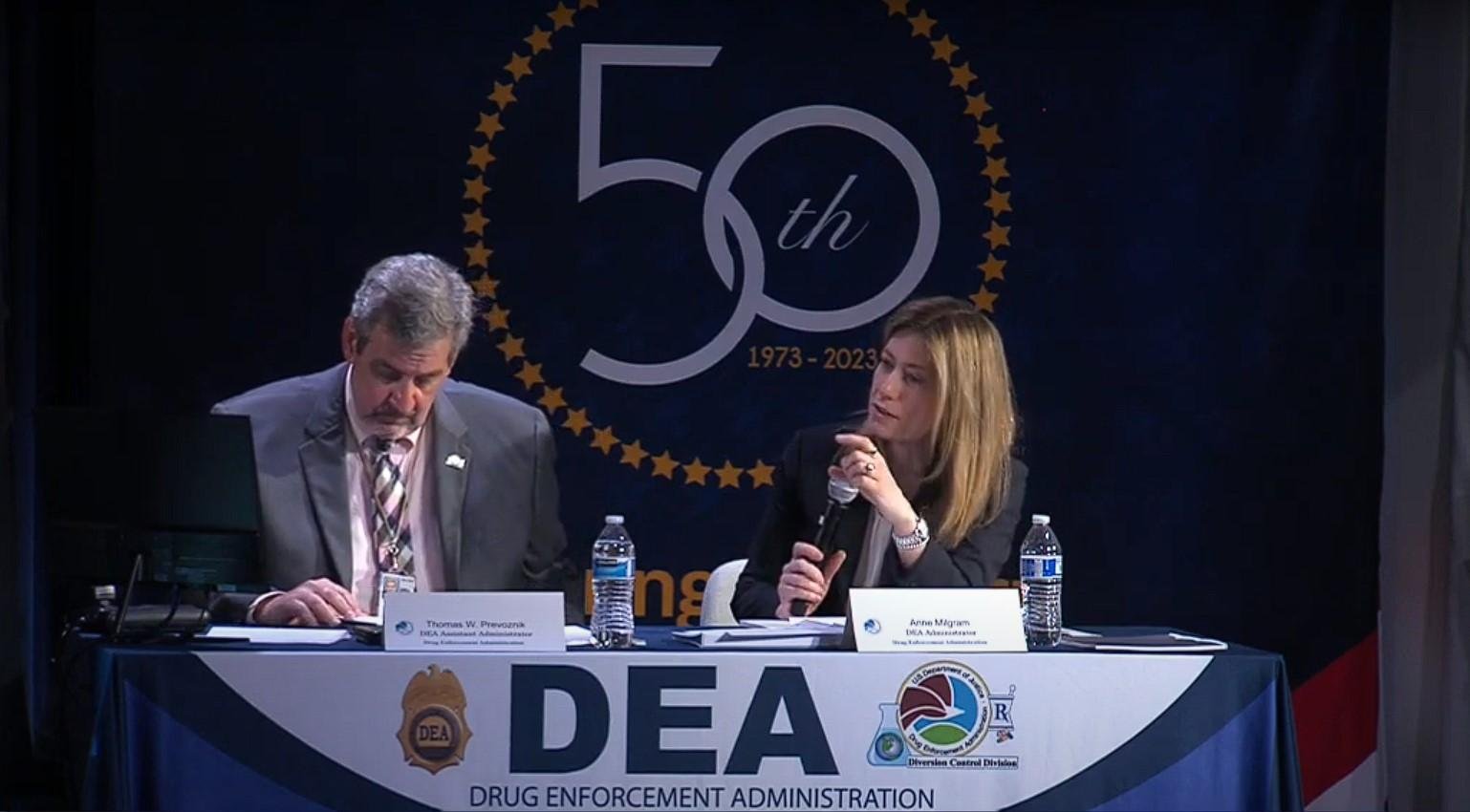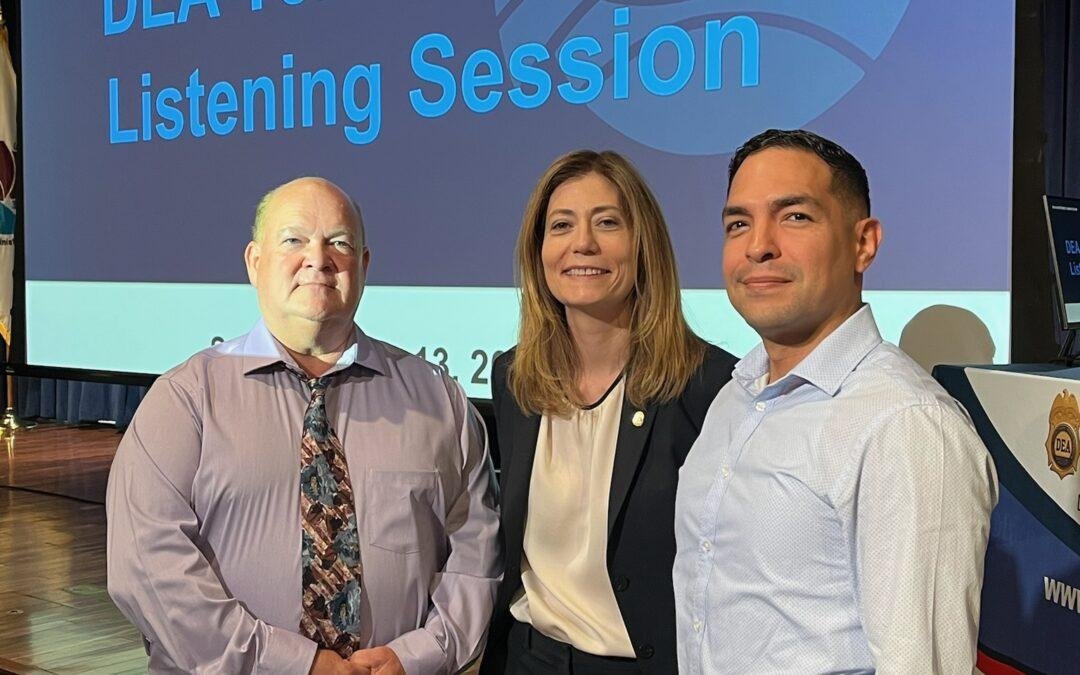The DEA recently held a listening session on telemedicine rules has ignited a debate that could shape the future of digital healthcare. As the world grapples with the aftermath of the COVID-19 pandemic, the question remains: Should telemedicine, which has proven invaluable during these trying times, become a permanent fixture in our healthcare system?
The Temporary Extension and Its Implications
The DEA, in partnership with SAMHSA, recently extended the COVID-19 telemedicine flexibilities for controlled medications. This move, effective from May 11, 2023, will last six months, with an additional year for telemedicine relationships established up to this date. This decision came in the wake of the DEA’s proposal to reintroduce limitations on virtual prescribing, which met with significant resistance from the medical and telehealth communities.

DEA Administrator Anne Milgram and Assistant Administrator Thomas Prevoznik during the DEA Telemedicine Listening Session. Both intently focused on the speakers and reflected genuine concern and interest. The weight of their roles is evident as they actively engage, aiming to understand the complexities and challenges presented by the proposed changes to telemedicine and controlled substance regulations.
DEA Telemedicine Listening Session in Arlington, Virginia
On September 12th and 13th, 2023, Matthew J Strait from the Office of Policy – Diversion Control Division led the Telemedicine Listening Session. DEA Administrator Anne Milgram and Assistant Administrator Thomas Prevoznik engaged deeply with the speakers, seeking to grasp the challenges arising from the proposed alterations to telemedicine and controlled substance regulations.

Dan Golden, the Administrator of East Coast Telepsychiatry, passionately spoke as he advocated for patients and providers at the DEA Telemedicine Listening Session in Arlington, Virginia. Mr. Golden took a proactive stance on modernizing DEA rules for telemedicine. His determined expression and the intensity of his speech reflect the company’s dedication to driving change in telehealth regulations.
East Coast Telepsychiatry’s Stance on Telemedicine
Dan Golden, the Administrator for East Coast Telepsychiatry and East Coast Family Medicine, was among the many voices advocating for the permanence of these temporary rules. The pandemic underscored the importance of telemedicine, especially in mental health via telepsychiatry. For many patients, especially those in remote or underserved areas, virtual consultations became the lifeline to essential care. Philip Moore, the chief medical officer of Gaudenzia, provided compelling evidence of telehealth’s efficacy. Gaudenzia, which served over 15,000 individuals last year, saw improved retention and treatment rates due to telehealth. Moore’s emphasis on the flexibility and accessibility telemedicine offers, especially for patients in rural areas, is a testament to its potential.

Anne Milgram, the DEA Administrator, stands confidently at the podium during the DEA Telemedicine Listening Session. Milgram’s role is pivotal as she navigates the discussions that will shape the future of telemedicine. Her engagement with the topic and the attendees underscores the session’s significance and the potential transformative impact on healthcare.
Concerns and Counter-Arguments at the DEA
Although the healthcare industry is moving towards a digital future, there are remaining obstacles. While some experts suggest increasing telemedicine training and enhancing patient verification procedures, others worry about potential misuse. For instance, nurse practitioner Felicia Bailey thinks the Drug Enforcement Agency should have greater access to clinical documentation to prevent abuse. Additionally, Roxanne Tyroch from the Texas Medical Association advises against relaxing safeguards restricting drug diversion. Caitlin Gillooley, from the American Hospital Association, criticized the DEA’s hesitation to implement a special registration process for telemedicine prescribing. She believes that the DEA overstates the focus on diversion and that the proposed record-keeping requirements may not offer additional protection.
Looking Ahead of the DEA Session
The DEA’s listening session highlighted the complexities of integrating telemedicine into our healthcare system. As the agency plans another written comment period in fall 2023, it’s clear that the conversation is far from over. The challenge lies in striking a balance between harnessing the potential of telemedicine and ensuring patient safety.
As the DEA reviews the 38,000 comments on its proposed telemedicine rules, one can only hope that the final decision will prioritize patient access to essential care without compromising safety and security. Here are the links to the DEA Telemedicine Listening Session for both days. You can find Mr. Golden’s segment beginning at the 4:37:45 mark on the Day 2 video. We recommend watching a substantial part of the video to grasp the full context.
